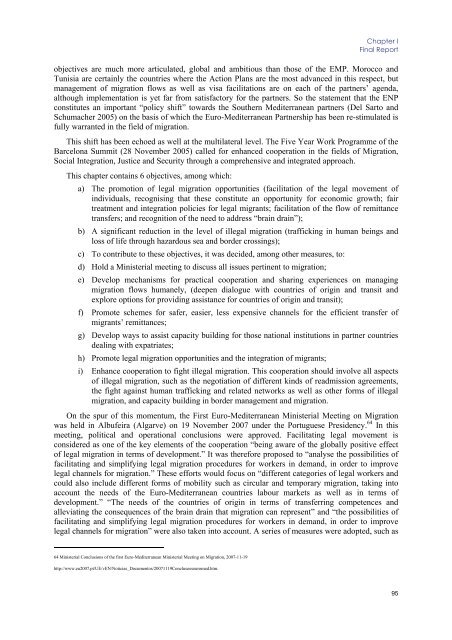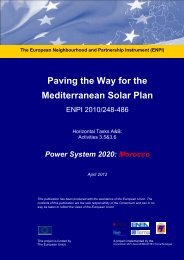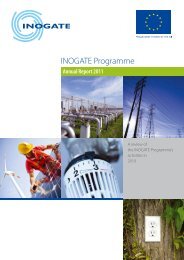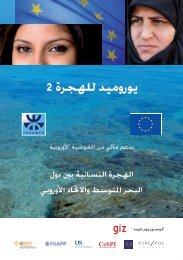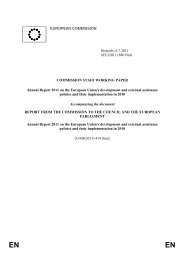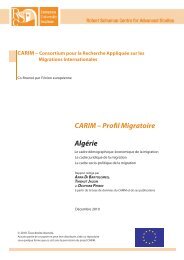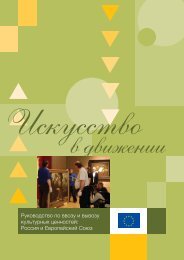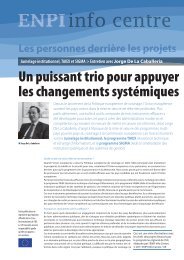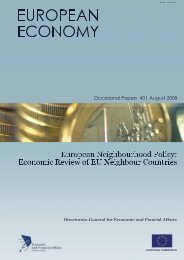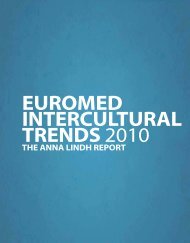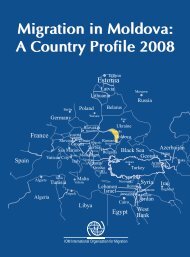<strong>European</strong> CommissionOccasional Paper 60, Volume Idialogue m<strong>and</strong>atory. 58 As a forum for such dialogue, specific working groups (subcommittees) on<strong>migration</strong> <strong>and</strong> social affairs have been established in the framework of the EMAAs with all the AMCsbut Syria. But sectoral policy dialogue on social issues has been too focused on the rights ofestablished migrant workers <strong>and</strong> <strong>migration</strong>, 59 <strong>and</strong> lacks any institutionalised, legally-bindingmechanism allowing for systematic <strong>and</strong> structured follow-up <strong>and</strong> monitoring (in fact, Sub-Committeeshave no decision power).However, a new impetus inspired by the Global Approach to Migration promoted by EUstakeholders has been played out in the framework of the Euro-Mediterranean Partnership in this fieldsince 2005, both as a consequence of the new pillar on cooperation in Justice <strong>and</strong> Home Affairs <strong>and</strong> ofthe implementation of the <strong>European</strong> Neighbourhood Policy. Indeed, in its launch phase the <strong>European</strong>Neighbourhood Policy raised new expectations regarding human mobility among EU neighbours. 60Contrary to the initial EMP which mainly addressed the integration of third-country nationals <strong>and</strong> thefight against irregular <strong>migration</strong>, the <strong>European</strong> Neighbourhood Policy accentuates the importance ofan integrated approach to <strong>migration</strong> in the EU-Arab Mediterranean relations including the movementof persons. In the Action Plans, new opportunities for legal economic <strong>migration</strong> are envisaged as partof a balanced approach <strong>and</strong> a positive option for both origin <strong>and</strong> host countries. Thus, the ENPstrengthens the foreign agenda of <strong>migration</strong> <strong>and</strong> introduces mutual commitments with a view todeveloping incremental joint <strong>migration</strong> management in the “illegal” but also the legal aspects.Indeed cooperation in the field of justice, security <strong>and</strong> <strong>migration</strong> is at the top of the agenda of theENP. For instance, the <strong>European</strong> Commission, in its 2006 Communication “On Strengthening the<strong>European</strong> Neighbourhood Policy”, 61 identified the following “action points” concerning “Mobility <strong>and</strong><strong>migration</strong>”:- Visa facilitation, removing obstacles to legitimate travel, e.g. for business, educational, tourism,official purposes.- Ensure well-managed mobility <strong>and</strong> <strong>migration</strong>, addressing readmission, cooperation in fightingillegal im<strong>migration</strong>, <strong>and</strong> effective <strong>and</strong> efficient border management.In its 2007 Communication “A Strong <strong>European</strong> Neighbourhood Policy” 62 the <strong>European</strong>Commission noted that “the promotion of mobility will go h<strong>and</strong> in h<strong>and</strong> with the commitment of ourpartners to increase security <strong>and</strong> justice <strong>and</strong> fight illegal <strong>migration</strong>, with efforts to strengthen ourneighbours’ capacity to deal with migratory <strong>flows</strong> to their countries, <strong>and</strong> with the security ofdocuments.” Therefore, it urged the EU Council <strong>and</strong> the <strong>European</strong> Parliament to adopt “its 2006‘package’ on legislative proposals aiming at revising the <strong>European</strong> Visa policy, ensuring a high levelof security within the common area <strong>and</strong> simplifying the procedures for visa applicants.”It must be also stressed that this issue is one of the priority areas of the ENP Regional IndicativeProgramme 2007-2013 63 which identifies a number of concrete projects <strong>and</strong> programmes. Legal<strong>migration</strong> is part of each of the Action Plans negotiated with the AMCs included in the ENP. The ENP58 See article 69 of the EC/Tunisia EMAA <strong>and</strong> correspondent provisions in the others agreements.59 For a complete list of Sub-Committees, see <strong>European</strong> Commission (2008, pp. 33-35).60 The EU Commission Communication on “Wider Europe” (2003) stresses that: “The EU should aim to develop a zone of prosperity <strong>and</strong> a friendly neighbourhood – a ‘ring of friends’ -with whom the EU enjoys close, peaceful <strong>and</strong> co-operative relations. In return for concrete progress demonstrating shared values <strong>and</strong> effective implementation of political, economic <strong>and</strong>institutional reforms, including in aligning legislation with the acquis, the EU’s neighbourhood should benefit from the prospect of closer economic integration with the EU. To this end,Russia, the countries of the Western NIS <strong>and</strong> the Southern Mediterranean should be offered the prospect of a stake in the EU’s Internal Market <strong>and</strong> further integration <strong>and</strong> liberalisation topromote the free movement of – persons, goods, services <strong>and</strong> capital (four freedoms)”.61 COM(2006)726 final, 4 December 2006, http://ec.europa.eu/world/enp/pdf/com06_726_en.pdf.62 COM(2007) 774 final, 05/12/2007, http://ec.europa.eu/world/enp/pdf/com07_774_en.pdf.63 ENPI Regional Strategy Paper (2007-2013) <strong>and</strong> Regional Indicative Programme (2007-2010) for the Euro-Mediterranean Partnership,http://ec.europa.eu/world/enp/pdf/country/enpi_euromed_rsp_en.pdf.94
Chapter IFinal Reportobjectives are much more articulated, global <strong>and</strong> ambitious than those of the EMP. Morocco <strong>and</strong>Tunisia are certainly the countries where the Action Plans are the most advanced in this respect, butmanagement of <strong>migration</strong> <strong>flows</strong> as well as visa facilitations are on each of the partners’ agenda,although implementation is yet far from satisfactory for the partners. So the statement that the ENPconstitutes an important “policy shift” towards the Southern Mediterranean partners (Del Sarto <strong>and</strong>Schumacher 2005) on the basis of which the Euro-Mediterranean Partnership has been re-stimulated isfully warranted in the field of <strong>migration</strong>.This shift has been echoed as well at the multilateral level. The Five Year Work Programme of theBarcelona Summit (28 November 2005) called for enhanced cooperation in the fields of Migration,Social Integration, Justice <strong>and</strong> Security through a comprehensive <strong>and</strong> integrated approach.This chapter contains 6 objectives, among which:a) The promotion of legal <strong>migration</strong> opportunities (facilitation of the legal movement ofindividuals, recognising that these constitute an opportunity for economic growth; fairtreatment <strong>and</strong> integration policies for legal migrants; facilitation of the flow of remittancetransfers; <strong>and</strong> recognition of the need to address “brain drain”);b) A significant reduction in the level of illegal <strong>migration</strong> (trafficking in human beings <strong>and</strong>loss of life through hazardous sea <strong>and</strong> border crossings);c) To contribute to these objectives, it was decided, among other measures, to:d) Hold a Ministerial meeting to discuss all issues pertinent to <strong>migration</strong>;e) Develop mechanisms for practical cooperation <strong>and</strong> sharing experiences on managing<strong>migration</strong> <strong>flows</strong> humanely, (deepen dialogue with countries of origin <strong>and</strong> transit <strong>and</strong>explore options for providing assistance for countries of origin <strong>and</strong> transit);f) Promote schemes for safer, easier, less expensive channels for the efficient transfer ofmigrants’ remittances;g) Develop ways to assist capacity building for those national institutions in partner countriesdealing with expatriates;h) Promote legal <strong>migration</strong> opportunities <strong>and</strong> the integration of migrants;i) Enhance cooperation to fight illegal <strong>migration</strong>. This cooperation should involve all aspectsof illegal <strong>migration</strong>, such as the negotiation of different kinds of readmission agreements,the fight against human trafficking <strong>and</strong> related networks as well as other forms of illegal<strong>migration</strong>, <strong>and</strong> capacity building in border management <strong>and</strong> <strong>migration</strong>.On the spur of this momentum, the First Euro-Mediterranean Ministerial Meeting on Migrationwas held in Albufeira (Algarve) on 19 November 2007 under the Portuguese Presidency. 64 In thismeeting, political <strong>and</strong> operational conclusions were approved. Facilitating legal movement isconsidered as one of the key elements of the cooperation “being aware of the globally positive effectof legal <strong>migration</strong> in terms of development.” It was therefore proposed to “analyse the possibilities offacilitating <strong>and</strong> simplifying legal <strong>migration</strong> procedures for workers in dem<strong>and</strong>, in order to improvelegal channels for <strong>migration</strong>.” These efforts would focus on “different categories of legal workers <strong>and</strong>could also include different forms of mobility such as circular <strong>and</strong> temporary <strong>migration</strong>, taking intoaccount the needs of the Euro-Mediterranean countries labour <strong>market</strong>s as well as in terms ofdevelopment.” “The needs of the countries of origin in terms of transferring competences <strong>and</strong>alleviating the consequences of the brain drain that <strong>migration</strong> can represent” <strong>and</strong> “the possibilities offacilitating <strong>and</strong> simplifying legal <strong>migration</strong> procedures for workers in dem<strong>and</strong>, in order to improvelegal channels for <strong>migration</strong>” were also taken into account. A series of measures were adopted, such as64 Ministerial Conclusions of the first Euro-Mediterranean Ministerial Meeting on Migration, 2007-11-19http://www.eu2007.pt/UE/vEN/Noticias_Documentos/20071119Conclusoeseuromed.htm.95
- Page 5 and 6:
STUDYLABOUR MARKETS PERFORMANCE AND
- Page 7 and 8:
Table of ContentsLABOUR MARKETS PER
- Page 10:
8.1 Actual migration and consumptio
- Page 15 and 16:
Chapter IFinal Report 15 MILLION NE
- Page 17 and 18:
Chapter IFinal Report …so that MI
- Page 19 and 20:
Chapter IFinal Reportroots). The cu
- Page 21 and 22:
Chapter IFinal Report In AMCs, REMI
- Page 23 and 24:
Chapter IFinal Reportpolicies. This
- Page 25 and 26:
Chapter IFinal ReportMediterranean
- Page 27 and 28:
Chapter IFinal ReportMore recently,
- Page 29 and 30:
Chapter IFinal Reportfor EU employm
- Page 31 and 32:
Chapter IFinal Reportchosen, these
- Page 33 and 34:
Chapter IFinal Reportexit of women
- Page 35 and 36:
Chapter IFinal ReportFigure 1.2.1.
- Page 37 and 38:
Chapter IFinal ReportA Declining Em
- Page 39 and 40:
Chapter IFinal ReportThe same year,
- Page 41 and 42:
Chapter IFinal ReportTable 2.2.1. I
- Page 43 and 44:
Chapter IFinal Reportminimum wages
- Page 45 and 46: Chapter IFinal Report2.4 Unemployme
- Page 47 and 48: Chapter IFinal ReportYouth Unemploy
- Page 49 and 50: Chapter IFinal ReportBut one should
- Page 51 and 52: Chapter IFinal Reportmillion) 10 .
- Page 53 and 54: Chapter IFinal Reportmight intensif
- Page 55 and 56: Chapter IFinal Reporttrue labour ma
- Page 57 and 58: Chapter IFinal Reportto reform the
- Page 59 and 60: Chapter IFinal ReportFrom a differe
- Page 61 and 62: Chapter IFinal ReportTable 4.2.1 Ou
- Page 63 and 64: Chapter IFinal ReportSource: Adams
- Page 65 and 66: Chapter IFinal Reportin the destina
- Page 67 and 68: Chapter IFinal ReportIn conclusion,
- Page 69 and 70: Chapter IFinal Reportorganised in B
- Page 71 and 72: Chapter IFinal Reportsecond Intifad
- Page 73 and 74: Chapter IFinal Reportstands at 29.7
- Page 75 and 76: Chapter IFinal Reportconstruction w
- Page 77 and 78: Chapter IFinal ReportAs far as the
- Page 79 and 80: Chapter IFinal Reportother cases, l
- Page 81 and 82: Chapter IFinal Reportunemployment a
- Page 83 and 84: Chapter IFinal Reportof Egypt, so f
- Page 85 and 86: Chapter IFinal ReportWhile progress
- Page 87 and 88: Chapter IFinal ReportThese reservat
- Page 89 and 90: Chapter IFinal ReportAs Figure 6.3.
- Page 91 and 92: Chapter IFinal Reportin skill devel
- Page 93 and 94: Chapter IFinal ReportThe Directive
- Page 95: Chapter IFinal ReportThe need for
- Page 99 and 100: Chapter IFinal Reporttrue Euro-Medi
- Page 101 and 102: Chapter IFinal Report- Putting empl
- Page 103 and 104: Chapter IFinal Report promotion of
- Page 105 and 106: Chapter IFinal ReportOtherADAMS, R.
- Page 107 and 108: Chapter IFinal ReportDE BEL-AIR, F.
- Page 109 and 110: Chapter IFinal ReportGUPTA, S., C.
- Page 111 and 112: Chapter IFinal ReportOECD (2000): M
- Page 113 and 114: Chapter II - Thematic Background Pa
- Page 115 and 116: Chapter IIThe impact of migration o
- Page 117 and 118: Chapter IIThe impact of migration o
- Page 119 and 120: Chapter IIThe impact of migration o
- Page 121 and 122: Chapter IIThe impact of migration o
- Page 123 and 124: Chapter IIThe impact of migration o
- Page 125 and 126: Chapter IIThe impact of migration o
- Page 127 and 128: Chapter IIThe impact of migration o
- Page 129 and 130: Chapter IIThe impact of migration o
- Page 131 and 132: Chapter IIThe impact of migration o
- Page 133 and 134: Chapter IIThe impact of migration o
- Page 135 and 136: Chapter IIThe impact of migration o
- Page 137 and 138: Chapter IIThe impact of migration o
- Page 139 and 140: Chapter IIThe impact of migration o
- Page 141 and 142: Chapter IIThe impact of migration o
- Page 143 and 144: Chapter IIThe impact of migration o
- Page 145 and 146: Chapter IIThe impact of migration o
- Page 147 and 148:
Chapter IIThe impact of migration o
- Page 149 and 150:
Chapter IIThe impact of migration o
- Page 151 and 152:
Chapter IIThe impact of migration o
- Page 153 and 154:
Chapter IIThe impact of migration o
- Page 155 and 156:
Chapter IIThe impact of migration o
- Page 157 and 158:
Chapter IIThe impact of migration o
- Page 159 and 160:
Chapter IIThe impact of migration o
- Page 161 and 162:
Chapter III - Thematic Background P
- Page 163 and 164:
Chapter IIIEU Migration Policy towa
- Page 165 and 166:
Chapter IIIEU Migration Policy towa
- Page 167 and 168:
Chapter IIIEU Migration Policy towa
- Page 169 and 170:
Chapter IIIEU Migration Policy towa
- Page 171 and 172:
Chapter IIIEU Migration Policy towa
- Page 173 and 174:
Chapter IIIEU Migration Policy towa
- Page 175 and 176:
Chapter IIIEU Migration Policy towa
- Page 177 and 178:
Chapter IIIEU Migration Policy towa
- Page 179 and 180:
Chapter IIIEU Migration Policy towa
- Page 181 and 182:
Chapter IIIEU Migration Policy towa
- Page 183 and 184:
Chapter IIIEU Migration Policy towa
- Page 185 and 186:
Chapter IIIEU Migration Policy towa
- Page 187 and 188:
Chapter IIIEU Migration Policy towa
- Page 189 and 190:
Chapter IIIEU Migration Policy towa
- Page 191 and 192:
Chapter IIIEU Migration Policy towa
- Page 193 and 194:
Chapter IIIEU Migration Policy towa
- Page 195 and 196:
Chapter IIIEU Migration Policy towa
- Page 197 and 198:
Chapter IIIEU Migration Policy towa
- Page 199 and 200:
Chapter IIIEU Migration Policy towa
- Page 201 and 202:
Chapter IIIEU Migration Policy towa
- Page 203 and 204:
Chapter IIIEU Migration Policy towa
- Page 205 and 206:
Chapter IIIEU Migration Policy towa
- Page 207:
Chapter IIIEU Migration Policy towa


